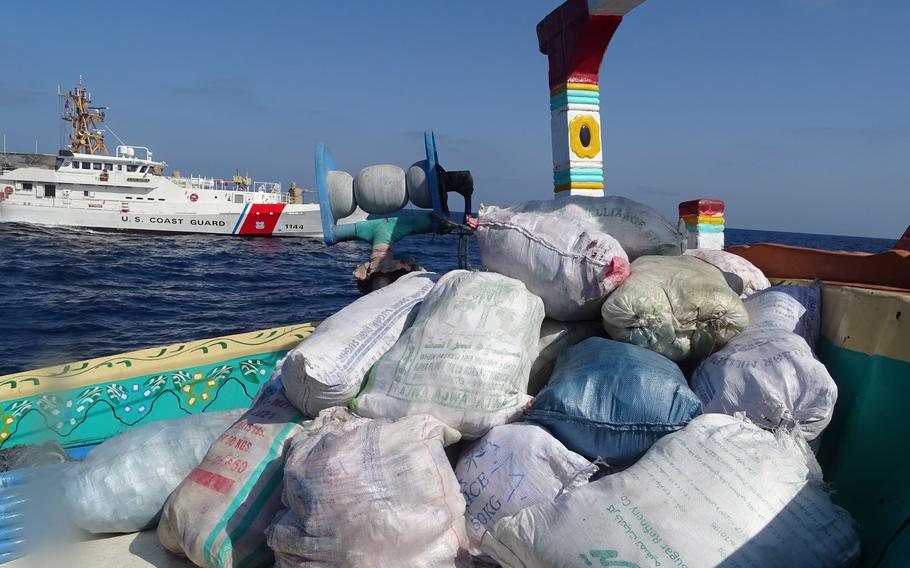
Bags of illegal drugs sit on the deck of a fishing vessel seized by U.S. Coast Guard cutter USCGC Glen Harris in the Gulf of Oman, May 10, 2023. Iran continues to supply Houthi rebels with arms, U.S. and Yemeni officials said May 11, 2023, after the U.S. Navy announced the seizure of two ships filled with heroin, which has been used to fund proxy militant groups. (U.S. Coast Guard)
Iran continues to supply Houthi rebels with arms and drugs to fund a shadow war in Yemen despite a deal with Saudi Arabia that was supposed to halt such practices, U.S. and Yemeni officials said this week.
The statements come after a U.S. Coast Guard cutter seized $110 million worth of heroin and methamphetamine from two ships in the waters in the Gulf of Oman south of Iran, the Navy’s 5th Fleet said.
Recent talks between Saudi Arabia and Iran on stopping the war in Yemen, in which opposing sides backed by the two governments have been clashing since 2014, were said to include a provision that Tehran would halt arms shipments to Houthi rebels, The Wall Street Journal reported in March.
But the U.S. has not seen a change in Iran’s operations, Tim Lenderking, U.S. special envoy for Yemen, said in a phone briefing with reporters Thursday.
“The Iranians have continued to smuggle weaponry and narcotics toward the conflict, and we are very concerned that this would continue despite the benefits that could come from a Saudi-Iran deal,” Lenderking said.
Yemen’s information minister, Muammar al-Eryani, also said Thursday that Iran was continuing to supply Houthi rebels, the Turkish state news agency Anadolu reported Friday. Al-Eryani referenced the U.S. seizures this week.
The two ships filled with drugs that were seized by the crew of the USCGC Glen Harris both came from the port of Chah Bahar in Iran, the 5th Fleet statement said.
The Coast Guard cutter seized $30 million worth of methamphetamine and heroin Monday from a fishing vessel and $80 million worth of heroin Wednesday, the statement said.
More U.S. vessels will soon be patrolling the waters of the Strait of Hormuz, off the coast of Iran, the 5th Fleet announced Friday.
The statement said the increase in the rotation of ships and aircraft is due to Iran’s recent seizure of two oil tankers.
U.S. officials have also repeatedly accused Iran of providing weapons, training and financial support to the Houthis, a Shiite rebel movement, that seized Sanaa, Yemen’s capital, in 2014, leading to a counteroperation by Saudi Arabia and other Middle Eastern countries.
A deal brokered by China to reestablish diplomatic relations between Iran and Saudi Arabia earlier this year raised expectations that the war would end.
Lenderking said the U.S. welcomes the deal, which provides an opening for peace.
“Our hope … is that Iran will change behavior and indeed, in the spirit of the agreement with the Saudis, support the peace effort vigorously in Yemen,” Lenderking said.